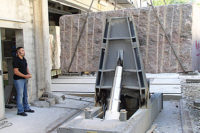

The facility sits on 320,000 square feet of space, including over 20,000 square feet of covered area. The production process begins with blocks, which are cut on one of two multi-wire saws from Wires Engineering. Each saw can be fitted with up to 15 wires at one time.
Marmocil's owners explained that using wire saws as opposed to gangsaws allows the company to process blocks into standard slabs as well as thicker pieces for architectural work. As a result, Marmocil has already completed large-scale architectural projects at its new factory. Each wire saw can process 65,000 square feet of material per month, making for a total of 130,000 square feet processed per month overall.
Once rough slabs are formed, they are processed on a LeviBreton slab polisher from Breton S.p.A. of Italy, which is equipped with 19 heads. The slabs are automatically loaded and unloaded from the polishing line with automated equipment from Breton. To ensure optimum water usage, an elaborate filtration system was installed at the factory.
Marmocil's facility has a total of 16 workers, and there are 24 employees in the company overall. The diamond wire saws operate 24 hours per day, and the Breton polishing line operates 8 hours per day. Even though monthly production is holding steady at 130,000 square feet, Marmocil is prepared for future expansion, as the Breton polishing line is capable of polishing over 320,000 square feet of stone per month if needed.
The company has 15 “key†materials in its collection, and it also tries to have a broad range of non-traditional Brazilian materials in stock. Marmocil has begun exporting its production, and the U.S. has been targeted as a critical market for the company. In fact, at the time of Stone World's visit to the facility, there were no less than seven containers of stone being prepared for shipment to the U.S.



